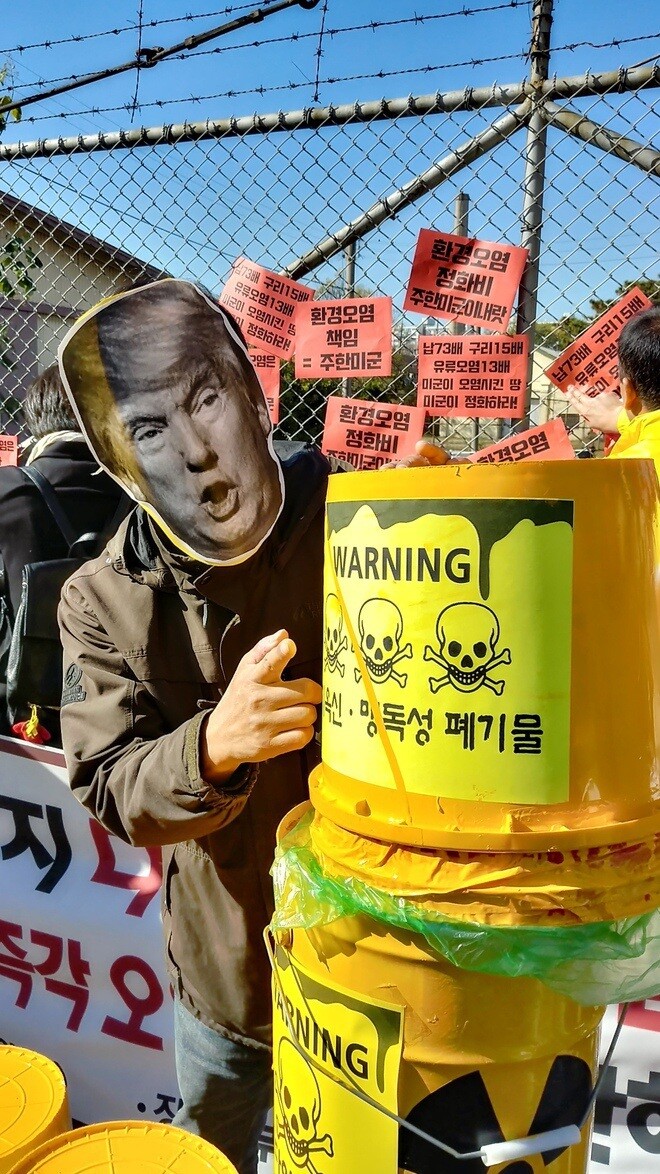hankyoreh
Links to other country sites 다른 나라 사이트 링크
Court orders Environment Ministry to disclose results of contamination survey in Bupyeong US military base

An indirect compulsion request filed by an environmental group against the Ministry of Environment after its refusal to disclose the findings of an environmental contamination survey on a US military base in Incheon’s Bupyeong district was accepted by a court.
Based on Article 34 of the Administrative Litigation Act (Indirect Compulsion of Judgment on Revocation of Refusal Disposition), the indirect compulsion system allows a court to order compensation for delays related to an administrative agencies failure to comply with a ruling. Following the court’s decision, the Ministry of Environment will have to pay the environmental group 3 million won (US$2,680) for each day after the 30-day grace period that elapses without it disclosing the information in question.
In response to the indirect compulsion request filed against the ministry by the Incheon chapter of Green Korea, the 13th division of Seoul Administrative Court under Hon. Judge Yu Jin-hyeon ruled that the ministry “must pay the Incheon chapter of Green Korea the amount of 3 million won per day as of the 31st day if it does not disclose the results of the Bupyeong military base environment contamination survey within 30 days.”
The Incheon chapter of Green Korea previously filed an administrative suit to overturn the Ministry of Environment’s May 2016 refusal to comply with an information disclosure request for the findings of environmental contamination and hazard assessments for the Bupyeong base. In Mar. 2018, the court in the case’s first trial ruled partially for the plaintiffs, demanding the disclosure of the survey’s “purpose and score” and the environment contamination survey’s “methods and findings” while allowing non-disclosure of the hazard assessment portion. The court in the second trial echoed the first court’s decision.
In response, the Incheon chapter of Green Korea gave up further appeals and demanded that the ministry disclose its environmental contamination survey findings. When the ministry refused, the group filed its indirect compulsion request. The ministry has adhered to a policy of nondisclosure on related information, citing a Status of Forces Agreement (SOFA) lower statute barring disclosure without the agreement of the US military.
“[The ministry] has not provided any information to the Incheon chapter of Green Korea despite being obligated to disclose information in accordance with an upheld ruling, and since no grounds can be found to suggest any legal impediment to the Ministry of Environment sharing the information, this request meets the necessary criteria for indirect compulsion,” the court concluded in its ruling.
At the same time, the court added, “In view of all that has emerged in the incident’s recording and questioning process, the necessary time limit for information disclosure his to be set at within 30 days rather than two, and the compulsory execution charge will be set at 3 million won per day.”
Ministry of Environment announces presence of excessive toxin levels in surrounding area
Park Ju-hee, secretary-general for the Incheon chapter of Green Korea, said, “After disregarding the public’s right to knowledge and refusing the disclose this information despite court rulings, the Ministry of Environment should apologize to the citizens of Incheon and immediately disclose the environmental contamination survey findings in accordance with this decision by Seoul Administration Court.”
Meanwhile, the Ministry of Environment announced that dioxin had been detected in excess of the threshold of 1,000pg-TEQ/g (one picogram = one-trillionth of a gram) in soil samples from seven of 33 locations investigated within the Bupyeong base in Dec. 2017. Maximum concentrations were as high as 10,347pg-TEQ/g.
Total petroleum hydrocarbons and trichloroethylene were also detected in underground water, and heavy metal contamination including copper, lead, arsenic, zinc, nickel, cadmium, hexavalent chromium, and mercury was confirmed.
By Lee Jeong-ha, Incheon correspondent
Please direct comments or questions to [english@hani.co.kr]

Editorial・opinion
![[Column] Park Geun-hye déjà vu in Yoon Suk-yeol [Column] Park Geun-hye déjà vu in Yoon Suk-yeol](https://flexible.img.hani.co.kr/flexible/normal/500/300/imgdb/original/2024/0424/651713945113788.jpg) [Column] Park Geun-hye déjà vu in Yoon Suk-yeol
[Column] Park Geun-hye déjà vu in Yoon Suk-yeol![[Editorial] New weight of N. Korea’s nuclear threats makes dialogue all the more urgent [Editorial] New weight of N. Korea’s nuclear threats makes dialogue all the more urgent](https://flexible.img.hani.co.kr/flexible/normal/500/300/imgdb/original/2024/0424/7317139454662664.jpg) [Editorial] New weight of N. Korea’s nuclear threats makes dialogue all the more urgent
[Editorial] New weight of N. Korea’s nuclear threats makes dialogue all the more urgent- [Guest essay] The real reason Korea’s new right wants to dub Rhee a founding father
- [Column] ‘Choson’: Is it time we start referring to N. Korea in its own terms?
- [Editorial] Japan’s rewriting of history with Korea has gone too far
- [Column] The president’s questionable capacity for dialogue
- [Column] Are chaebol firms just pizza pies for families to divvy up as they please?
- [Column] Has Korea, too, crossed the Rubicon on China?
- [Correspondent’s column] In Japan’s alliance with US, echoes of its past alliances with UK
- [Editorial] Does Yoon think the Korean public is wrong?
Most viewed articles
- 1[Column] Park Geun-hye déjà vu in Yoon Suk-yeol
- 2Will NewJeans end up collateral damage in internal feud at K-pop juggernaut Hybe?
- 3N. Korean hackers breached 10 defense contractors in South for months, police say
- 4Thursday to mark start of resignations by senior doctors amid standoff with government
- 5[Guest essay] The real reason Korea’s new right wants to dub Rhee a founding father
- 6Kim Jong-un expressed ‘satisfaction’ with nuclear counterstrike drill directed at South
- 7Up-and-coming Indonesian group StarBe spills what it learned during K-pop training in Seoul
- 8Why Korea shouldn’t welcome Japan’s newly beefed up defense cooperation with US
- 9Opposition calls Yoon’s chief of staff appointment a ‘slap in the face’
- 10Terry Anderson, AP reporter who informed world of massacre in Gwangju, dies at 76